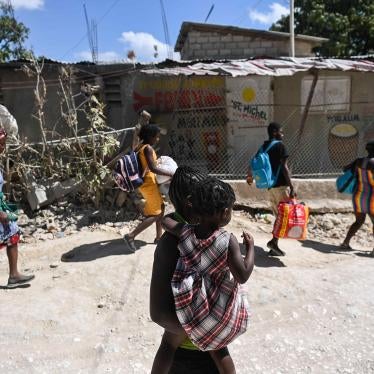World leaders gathering in New York this week for the United Nations General Assembly have an opportunity to give Haiti the attention it deserves through concrete financial, technical, and logistical commitments. Immediate and coordinated action is essential and can make a real difference for the millions of Haitians whose lives are at risk.
Over the past three years, Haiti has been engulfed by one of the world’s worst humanitarian and security crises. Some 300 violent criminal groups control nearly 80 percent of the metropolitan area of the capital Port-au-Prince and are increasingly active in the country’s rural areas. They terrorize local residents – killing, raping, and kidnapping at will– and prevent the free movement of people and goods. The violence has forced schools and hospitals to close and has made daily survival a struggle for many. Nearly five million Haitians are acutely food insecure, including about 1.6 million people who are facing emergency levels of food insecurity, according to the UN.
Yet despite this dire situation, our recent visit to Haiti showed some glimmers of hope.
The new transitional prime minister, Garry Conille, who has a humanitarian background, has publicly pledged to prioritize the rule of law and combat corruption while respecting human rights. This is a welcome commitment in a country where traditional political actors and the economic elite have long backed the criminal groups, using them to access resources and win elections that have hardly been free or fair.
Conille’s government recently finalized a “roadmap” that incorporates many of the key recommendations Human Rights Watch and Haitian civil society groups have identified as being essential to effectively address the crisis.
Meanwhile, the UN-authorized Multinational Security Support mission (MSS) led by Kenya, is finally operational. The mission will support the Haitian National Police in restoring basic security and state control and carries with it strong policies to monitor the force’s conduct, ensure respect for human rights, and avoid the failures and abuses associated with past international interventions in Haiti.
But despite some good will and commitments, the government, the MSS, and humanitarian and human rights groups working in Haiti don’t have anywhere near the resources needed to effectively address the challenges. The MSS only has 425 of the expected 2,500 personnel on the ground in Haiti and has only received around US$85 million through the UN-controlled Trust Fund, in addition to direct contributions – primarily $369 million from the United States – far below the estimated $600 million required annually for its operation.
The UN’s humanitarian appeal for Haiti is only 35 percent funded and faces a $437.5 million gap. The transitional government will need significant resources to restore state control; ensure residents have access to basic necessities, such as food, health care, and education; rebuild the justice system; and implement programs to support survivors of sexual violence and vulnerable children in areas controlled by criminal groups. More international support and coordination is needed now.










